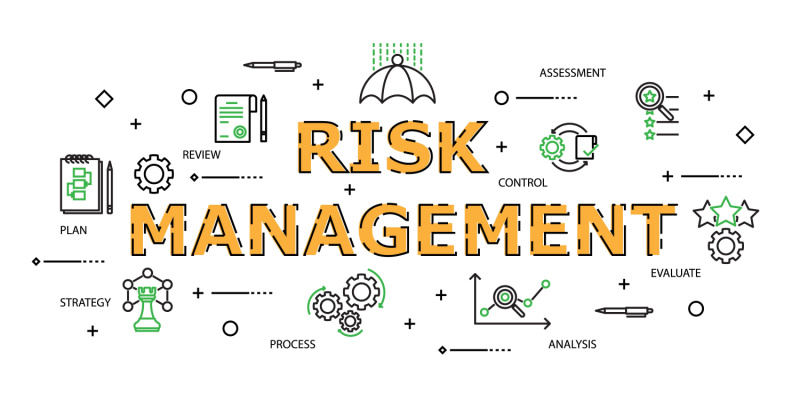What is a risk? In simple terms, risk is anything that affects a business's operations. It can be an event, an unexpected circumstance, or a decision taken by employers or employees.
As with life, risks are inevitable in business. Big or small, risks are an intrinsic part of every stage of the business. Some risks are reasonable, and they turn out to be beneficial for your company. Other risks, however, could pose a significant threat and threaten organisational stability, affecting everyone in the long run.
This is where risk management comes into play. Businesses must try to identify the risks they are exposed to in advance and prepare for them.
How Does Risk Management Work in Businesses?
Risk Management in business has three prime objectives:
- Identify and analyse the risk factors.
- Control the risk factors with immediate effect.
- Protect the organisation from unexpected loss and other threats.
>
Moreover, these objectives encompass everything risk management entails. Besides, with most risks being unpredictable in terms of type and degree, effective leadership can reduce their chances of occurring and their consequences.
Every step and strategy in risk management is an art and science because of the wildly unpredictable nature of business risks.
Risk managers have their work cut out for them in terms of identifying risks, assessing them, and finding solutions to prevent them.
Generally, there are four types of risks that businesses face.
1. Financial risks
All businesses take financial risks daily when dealing with loans, product pricing and distribution, inventory purchase, etc. Mergers and acquisitions are bigger financial risks. Financial risks keep a company running; hence, they are ‘necessary evils.”
2. Operational risks
The day-to-day work of running a business is full of unexpected events. There is always the possibility of your computer system failing, your employees making significant mistakes, and cyber criminals gaining access to your data. These risks can bring your business to a temporary standstill causing a major loss of revenue.
3. Strategic risks
Poor business decisions, inaccurate forecasts, inadequate cash flow, and changes in the economy are all examples of strategic risks that managers need to be aware of.
4. Hazards
Hazards comprise anything that could hurt your employees or damage your business property. These risks are higher in places that deal with chemicals and heavy machinery. However, even the smallest electrical short circuit in an office and natural disasters can cause massive damage. In short, all risks that are not within the control of the workplace environment can be categorised as hazards.
These above-mentioned risks can have disastrous effects. Natural disasters like earthquakes or tsunamis can completely wipe out the business forever. Cyber threats like ransomware and data breaches can cripple the company, forcing it to shut down permanently.
Yes, risks are scary.
10 Reasons Why Risk Management Is A Must
The omnipresent possibility of risks increases the need for effective risk management. Making it an essential component of your organisation is a wise decision because it:
- Helps you arrive at better decisions concerning workplace safety, financial security, and regulatory compliance.
- Gives you clarity about risky business strategies and their outcomes and clears you of pitfalls.
- Keeps you away from legal liabilities, property or monetary losses, and collateral damage.
- Demonstrates your company’s social responsibility by implementing eco-friendly mitigation plans.
- Protects your reputation and image, keeps your staff safe from potential harm and increases awareness about avoiding risks.
- Ensures compliance with safety rules eliminates unnecessary costs and protects your company against all risks.
- Steers your business away from potential threats that can cause loss of revenue, time, and customers.
- Keeps your workplace and its environment safe from harmful incidents and accidents.
- Ensures a safe and reliable workplace for all your employees and outsiders involved in your business.
- Protects all business resources that keep your business running, such as your finance, manpower, equipment, etc.
So, what does risk management do? Let’s explore this further.
5 Steps to Implementing Good Risk Management
In general, various types of risks require different approaches to risk management; however, each process follows the same steps:
Step 1
Identifying the existing risks by reviewing the sources and ranking them according to their priority. Gathering this crucial information may require some intense brainstorming sessions with your team heads in this first step.
Step 2
The next step is assessing the amount of damage the risk may cause your organisation. This step is where you ensure that the risks do not thwart your business goals and objectives.
Step 3
Formulating response strategies if and when the risk occurs despite all preventive measures. Here’s where you develop contingency plans and security measures to protect your workforce and properties from the danger.
Step 4
Focusing on creating risk prevention strategies and mechanisms to avoid any risks in the future. You can derive vital information from strategy already in place to handle existing risks.
Step 5
Tracking and monitoring new and existing risks are integral to the mitigation plan. It is also essential to periodically review and adjust the overall risk management process to stay current and ready.
Why UAE-Based Businesses Should Consider Risk Management Services
Does your business operate in the UAE? In case you haven't already taken steps towards risk management, it's time to do so. Unsurprisingly, new companies are proliferating in the UAE as the country presents a conducive environment for investors. There is also an increase in the risks that these entities face, which reinforces the need for risk management services in the UAE because these services do the following for you:
- Evaluate existing risks and your financial capability to implement risk management procedures.
- Enhance and update your existing risk management strategies and procedures to meet your company’s expectations.
- Stay aligned with unexpected regulatory changes and ensure timely compliance with UAE laws.
- Devise a robust compliance program that provides you to not spend unnecessarily on compliance costs.
Whether you are deep-rooted or entirely new to UAE’s business environment, entrusting your risk management to reputed service providers like Fortius greatly improves your chances of staying risk-free.
6 Important Functions of Risk Management Services
Opting for risk management services is a wise investment that protects your business, its assets, resources, and your workforce safe from risks. Even when unforeseen incidents occur, your risk management service provider will ensure you are up and running again with minimum loss of time or money.
Risk management services encompass integral functions such as:
- Taking care of your financial license applications.
- Reviewing the operations of your financial department.
- Improving internal communication to identify and mitigate risk factors.
- Evaluating risk control procedures and their proper implementation.
- Choosing the best insurance policies to align with financial and environmental liabilities changes.
- Auditing business processes, inspecting the premises and training your staff.
The Takeaway
Risks are part and parcel of every business. While you needn’t worry about good risks, it’s the harmful ones you need to stay vigilant about. Handing this burden to an experienced service provider like Fortius will help your business for years to come.
Please feel free to call us for risk management consulting. Let’s get the ball rolling and keep your business completely risk-free!






